The United States Armed Forces are the military forces of the United States. The armed forces consists of six service branches: the Army, Marine Corps, Navy, Air Force, Space Force, and Coast Guard. The president of the United States is the commander-in-chief of the armed forces and forms military policy with the Department of Defense (DoD) and Department of Homeland Security (DHS), both federal executive departments, acting as the principal organs by which military policy is carried out. All six armed services are among the eight uniformed services of the United States.

Military recruit training, commonly known as basic training or boot camp, refers to the initial instruction of new military personnel. It is a physically and psychologically intensive process, which resocializes its subjects for the unique demands of military employment.

The South African Army is the principal land warfare force of South Africa, a part of the South African National Defence Force (SANDF), along with the South African Air Force, South African Navy and South African Military Health Service. The Army is commanded by the Chief of the Army, who is subordinate to the Chief of the SANDF.

The Zimbabwe National Army (ZNA) is the primary branch of the Zimbabwe Defence Forces responsible for land-oriented military operations. It is the largest service branch under the Zimbabwean Joint Operations Command (JOC). The modern army has its roots in the Rhodesian Army, which was raised between 1963 and 1964 after the breakup of the Federation of Rhodesia and Nyasaland. A Joint High Command created in March 1980 to oversee integration of the formerly belligerent Rhodesian Security Forces, Zimbabwe African National Liberation Army (ZANLA), and the Zimbabwe People's Revolutionary Army (ZIPRA) officially established the Zimbabwe National Army in late 1980, nearly a year after the end of the Rhodesian Bush War.
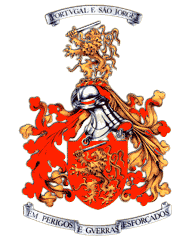
The Portuguese Army is the land component of the Armed Forces of Portugal and is also its largest branch. It is charged with the defence of Portugal, in co-operation with other branches of the Armed Forces. With its origins going back to the 12th century, it can be considered one of the oldest active armies in the world.

Marines, or naval infantry, are typically a military force trained to operate in littoral zones in support of naval operations. Historically, tasks undertaken by marines have included helping maintain discipline and order aboard the ship, the boarding of vessels during combat or capture of prize ships, and providing manpower for raiding ashore in support of the naval objectives. In most countries, the marines are an integral part of that state's navy.
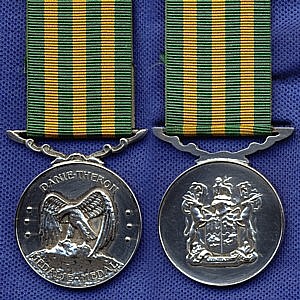
The Danie Theron Medal, post-nominal letters DTM, is a military decoration which was instituted by the Republic of South Africa in 1970 and which was in use until 1993. It was awarded for diligent service in the Commandos, the rural defence component of the South African Defence Force. Originally reserved for officers, it was available to all ranks from 1975.

The Jack Hindon Medal, post-nominal letters JHM, is a South African military decoration which was instituted in the Republic of South Africa in 1970 and which was only in use until 1975. It was awarded to other ranks for diligent service in the Commandos, the rural defence component of the South African Defence Force.
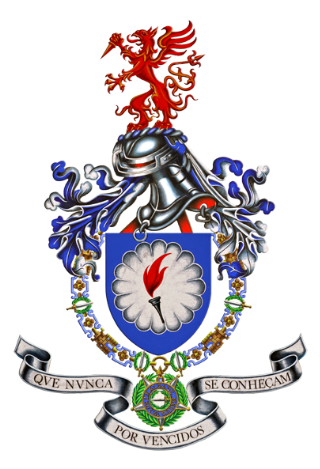
The Regimento de Paraquedistas, based in Tancos, Portugal, is a unit of the Portuguese Army and serves as the instruction center for recruitment and training of the Portuguese paratroopers. This unit includes an entire battalion, acting as support and reserve for airborne units which contains for example, military war dogs and airborne pathfinders and an instruction battalion responsible for the forming of new paratroopers.

Daniël Johannes Stephanus "Danie" Theron was a Boer Army military leader and master scout. Born in Tulbagh, Cape Colony, he was raised in Bethlehem, Orange Free State. He is best known as the driving force behind the formation of a military bicycle corps used by the Boer Army for scouting and relaying messages. Originally trained as a school teacher, he became a lawyer and notary with his own law firm in Krugersdorp, Transvaal Republic, and was made a commandant in the Boer forces during the Second Anglo-Boer War. During the course of the war, he was put in charge of a significant scouting unit, Theron se Verkenningskorps (TVK). He fought at the Battle of Spion Kop and one of his most famous feats occurred at the Battle of Paardeberg. The British Commander in Chief, Lord Roberts, called Theron: "the hardest thorn in the flesh of the British advance", put a reward of £1,000 on his head – dead or alive – and dispatched 4,000 soldiers to find and eliminate the TVK.
A School of Infantry provides training in weapons and infantry tactics to infantrymen of a nation's military forces.

The South African Army Training Formation is the controlling entity of all South African Army training units. The Formation was established in April 1999 and mandated to provide, maintain and sustain landward common training to the SA Army.
Edward George McGill Alexander is a former South African Army officer.

The South African Infantry School is within the Army Base in Oudtshoorn, Western Cape. The Infantry School, now at Oudtshoorn, was established in November 1953, after a history dating back to the South African Military School in Bloemfontein, established in 1912. It is the Infantry’s “centre of excellence” and offers a number of infantry-specific courses to regulars and Reservists.

Eastern Province Command was a command of the South African Army.
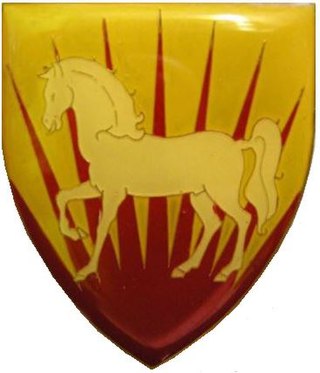
Middelburg Commando was a light infantry regiment of the South African Army. It formed part of the South African Army Infantry Formation as well as the South African Territorial Reserve.

The School of Engineers is part of the South African Army Engineer Formation, which provides combat engineering corps training and teaching to military officers and personnel as well as other Military Schools throughout the South African National Defence Force. They are currently the only Military School in Southern Africa to formally present IEDD.
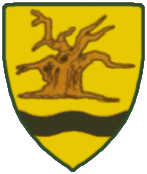
Limpopo Commando was a light infantry regiment of the South African Army. It formed part of the South African Army Infantry Formation as well as the South African Territorial Reserve.
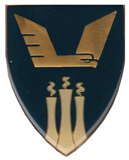
Sasolburg Regiment was a light infantry regiment of the South African Army. It formed part of the South African Army Infantry Formation as well as the South African Territorial Reserve.

11 Commando was an infantry training battalion of the South African Army Infantry Formation Corps.



















